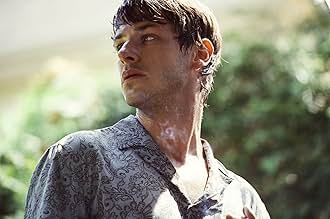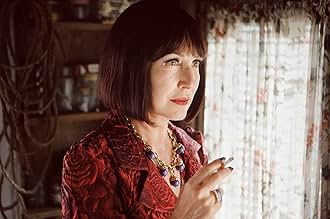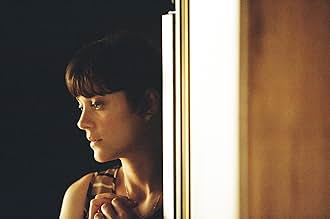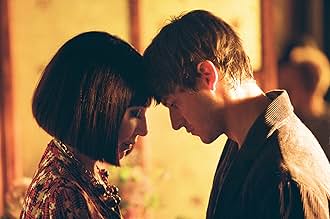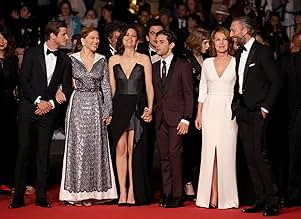CALIFICACIÓN DE IMDb
6.8/10
26 k
TU CALIFICACIÓN
Louis, un escritor con una enfermedad terminal, regresa a casa después de una larga ausencia para contar a su familia que está muriendo.Louis, un escritor con una enfermedad terminal, regresa a casa después de una larga ausencia para contar a su familia que está muriendo.Louis, un escritor con una enfermedad terminal, regresa a casa después de una larga ausencia para contar a su familia que está muriendo.
- Dirección
- Guionistas
- Elenco
- Premios
- 19 premios ganados y 39 nominaciones en total
Antoine DesRochers
- Pierre Jolicoeur
- (as Antoine Desrochers)
- Dirección
- Guionistas
- Todo el elenco y el equipo
- Producción, taquilla y más en IMDbPro
Opiniones destacadas
More like a stage play than a movie, about an extremely unlikable family. I wouldn't want to spend more than one minute in the company of any of them. All they do is shout at each other. I'm not surprised that Louis never visited them. Whether you watch this to the end or not depends on your tolerance for screaming idiots. My advice is ... don't.
I think it's beautiful when creators explain more in shadows and silences than in dialogue and obvious visual cues. There is true brilliance to be found in the hidden and the unsaid; oftentimes, the truth comes in subtle ripples than in galvanized waves, and it's exceptional to come across true masters of the craft who are willing to respectfully handle such an intricate technique without becoming dull and overbearing.
Regrettably, such is not the case here.
Dolan tries to sweep us off our feet with anthropocentric framing and a flowing stream of ethereal brushings of color and emotion, something he does well, I can't deny him that. In the meanwhile though, he seems to be neglecting the actual plot which is painfully lacking on so many points, this movie is rendered into nothing more than a neophyte's attempt at a college- level, arthousy project.
Fortunate that the entirety of the cast is strong enough to redeem this effort by generously depositing spiritful performances, thankfully seeming to overcome the dire facts that the writing is listless, the plot is dormant, and the whole movie seems painfully mannered and conditional. So much so, that the viewer is bound to be left confused and, at times, attacked by the drip-fed, self-folding, monotonous interactions that ultimately serve to dress the movie with no pragmatic value at all.
In aiming for elegance and allure, Dolan fails to dish out a well-founded, coherent film, leaving us with nothing more than an unprogressive fable that tiptoes along the verge of deforming from 'suspended' to 'backwards'. And all very chaotically wrapped in out-of-place musical choices, not enhancing but rather debasing the scenes, pulling the viewer out of the experience in flabbergasted eye-rolls.
My point of view: Overlooking the feeble dialogue, overall repetitiveness, plot stagnancy and forced emotive filming techniques, I rather enjoyed the performances -- and here is where I rate this. It's Only The End of the World is a lifeless attempt, devoid of any true passion and it could have very easily broken down into oblivion the moment the end titles started rolling - if it weren't for Vincent Cassel's very last scene which, yet again, validates him as one of the Greats.
Lucky for me I will always have that to remember.
Regrettably, such is not the case here.
Dolan tries to sweep us off our feet with anthropocentric framing and a flowing stream of ethereal brushings of color and emotion, something he does well, I can't deny him that. In the meanwhile though, he seems to be neglecting the actual plot which is painfully lacking on so many points, this movie is rendered into nothing more than a neophyte's attempt at a college- level, arthousy project.
Fortunate that the entirety of the cast is strong enough to redeem this effort by generously depositing spiritful performances, thankfully seeming to overcome the dire facts that the writing is listless, the plot is dormant, and the whole movie seems painfully mannered and conditional. So much so, that the viewer is bound to be left confused and, at times, attacked by the drip-fed, self-folding, monotonous interactions that ultimately serve to dress the movie with no pragmatic value at all.
In aiming for elegance and allure, Dolan fails to dish out a well-founded, coherent film, leaving us with nothing more than an unprogressive fable that tiptoes along the verge of deforming from 'suspended' to 'backwards'. And all very chaotically wrapped in out-of-place musical choices, not enhancing but rather debasing the scenes, pulling the viewer out of the experience in flabbergasted eye-rolls.
My point of view: Overlooking the feeble dialogue, overall repetitiveness, plot stagnancy and forced emotive filming techniques, I rather enjoyed the performances -- and here is where I rate this. It's Only The End of the World is a lifeless attempt, devoid of any true passion and it could have very easily broken down into oblivion the moment the end titles started rolling - if it weren't for Vincent Cassel's very last scene which, yet again, validates him as one of the Greats.
Lucky for me I will always have that to remember.
Critics shouldn't be criticizing films they don't understand. Xavier Dolan's movies are extremely subtle in their acting and dialogues which I think makes it more difficult for non-French speakers to understand. This is especially true for this film since the movie is based upon the impossibility to communicate. That's probably why most of the bad reviews come from American newspapers. I mean, I'm French and I honestly admire non-French speaking fans of Dolan because subtitles aren't enough to communicate the subtlety of each word and tone. Aside from that it's only a matter of taste.
I agree on the fact that some characters are a bit stereotyped, especially during the scenes in which the whole family is gathered. However each actor has a scene in which they speak in private with Louis and that's when their characters get interesting. The film is aesthetically brilliant and allows you to understand things only eyes can communicate. The movie constantly creates an emotional tension, something I've rarely felt.
I agree on the fact that some characters are a bit stereotyped, especially during the scenes in which the whole family is gathered. However each actor has a scene in which they speak in private with Louis and that's when their characters get interesting. The film is aesthetically brilliant and allows you to understand things only eyes can communicate. The movie constantly creates an emotional tension, something I've rarely felt.
b.r.i.l.l.i.a.n.t! I saw this movie at TIFF on Sept. 17 and it was the first Dolan film I've seen. It deserves the award it received at Cannes! Despite all the shouting and intensity, this film conveys with subtlety, suggestive dialogue and glances, the range of emotions felt by different members of a family when there has been an unexplained loss of another family member. Even though the main character, Louis, is still alive and returns to the family, they react as if he has returned from an unexpected death. They range from guilt, rage, idealization, and denial.The close-up filming style also reveals each family member's pain in intimate detail. Dolan is brilliant in his interpretation of that family's deep pain and Louis's coming to terms with not only his own impending death but the "death" the family already has had to deal with when he went away the first time.
I read Jean-Luc Lagarce's play "Juste la fin du monde" a while back and it didn't really make an impression on me. So I was quite intrigued and just a tiny bit worried when I learned that Xavier Dolan, possibly my favorite contemporary film director, was adapting this to me impenetrable text into a movie.
I had confidence in Dolan's genius and was rewarded beyond expectations. The film is as magnificent as anything Dolan has created before. He has said in interviews that at first reading Lagarce's language- also off-putting for me- didn't impress him but that he discovered its power on second random reading. I'm grateful he did and that he has now shared this discovery with his audience with the aid of some truly superb acting performances.
The very first scene establishes everything with narration by protagonist Louis (Gaspard Ulliel), a successful author who is flying to see his family for the first time in over a decade. Louis is dying. Dolan hides Ulliel's face with shadowy lightning and a cap as well as utilizes close-ups so extreme you can't get a proper feel of a face. The close focus continues in the following scenes of Louis's family, only to very gradually move away as the film progresses.
Greeting Louis are his extravagant mother Martine (Nathalie Baye), his coolly detached younger sister Suzanne (Léa Seydoux), his dominant yet socially awkward older brother Antoine (Vincent Cassel) as well as Antoine's shy, even more socially awkward wife Catherine (Marion Cotillard).
Dolan tends to depict extreme personal conflict in his work, uniting his fiercely dramatic, richly colored and always unique visuals with raw scripts that seem to channel Ingmar Bergman's best work. This also occurs in "Juste la fin du monde".
If you looked at the movie without sound you could mistake it for a regular- if exceptionally well shot and acted- drama about a family uniting with the result of old wounds and conflicts emerging and taking over the scenes. This is indeed what basically happens here, but the dialog, to me so difficult to digest from the pages of a book, makes it all about what is left unsaid. Because even as extreme emotion takes over the characters and bursts out they still can't communicate with each other. Lines that one would expect to convey full, sincere, angry honesty are expressed through awkward, even incomprehensible dialog that only hints at the apparently troubled history of these people.
Louis, as mellow and conciliatory as he acts, seems to be a dangerous catalyst for his family, an antigen they all defend their nest against. This is endlessly fascinating and sold so well by the actors, each and every one of them marvelous. The title becomes darkly ironic, as Louis soon seems to find his impending death a minor problem in his severely dysfunctional family. He connects with Catherine, another outsider and someone who he hasn't met before this one day during which the whole film occurs. "How much time?" Catherine asks Louis, a question that together with the offhand mention of Louis's first boyfriend having passed away from "cancer" establishes the fatal backdrop of the AIDS epidemic.
At first glance "Juste la fin du monde" might seem like a melodramatic shouting match that emerges unfocused and aimless, but I ultimately find it urgently compelling and even insightful through its sustained aversion to a genuine unmasking of characters.
Lagarce wrote the original play in 1990, reportedly to examine his own mortality. He was dying himself at that time and finally succumbed to AIDS in 1994. There is a touching dimension to the script's nightmarish reunion as we sense Louis's need to come full circle, to rediscover his childhood and adolescence, even to assure himself that his already estranged family can survive after he's gone. Death is ever present, and instead of trivializing the personal conflicts it elevates them, because they are if nothing else moments of vitality for people not truly living.
I had confidence in Dolan's genius and was rewarded beyond expectations. The film is as magnificent as anything Dolan has created before. He has said in interviews that at first reading Lagarce's language- also off-putting for me- didn't impress him but that he discovered its power on second random reading. I'm grateful he did and that he has now shared this discovery with his audience with the aid of some truly superb acting performances.
The very first scene establishes everything with narration by protagonist Louis (Gaspard Ulliel), a successful author who is flying to see his family for the first time in over a decade. Louis is dying. Dolan hides Ulliel's face with shadowy lightning and a cap as well as utilizes close-ups so extreme you can't get a proper feel of a face. The close focus continues in the following scenes of Louis's family, only to very gradually move away as the film progresses.
Greeting Louis are his extravagant mother Martine (Nathalie Baye), his coolly detached younger sister Suzanne (Léa Seydoux), his dominant yet socially awkward older brother Antoine (Vincent Cassel) as well as Antoine's shy, even more socially awkward wife Catherine (Marion Cotillard).
Dolan tends to depict extreme personal conflict in his work, uniting his fiercely dramatic, richly colored and always unique visuals with raw scripts that seem to channel Ingmar Bergman's best work. This also occurs in "Juste la fin du monde".
If you looked at the movie without sound you could mistake it for a regular- if exceptionally well shot and acted- drama about a family uniting with the result of old wounds and conflicts emerging and taking over the scenes. This is indeed what basically happens here, but the dialog, to me so difficult to digest from the pages of a book, makes it all about what is left unsaid. Because even as extreme emotion takes over the characters and bursts out they still can't communicate with each other. Lines that one would expect to convey full, sincere, angry honesty are expressed through awkward, even incomprehensible dialog that only hints at the apparently troubled history of these people.
Louis, as mellow and conciliatory as he acts, seems to be a dangerous catalyst for his family, an antigen they all defend their nest against. This is endlessly fascinating and sold so well by the actors, each and every one of them marvelous. The title becomes darkly ironic, as Louis soon seems to find his impending death a minor problem in his severely dysfunctional family. He connects with Catherine, another outsider and someone who he hasn't met before this one day during which the whole film occurs. "How much time?" Catherine asks Louis, a question that together with the offhand mention of Louis's first boyfriend having passed away from "cancer" establishes the fatal backdrop of the AIDS epidemic.
At first glance "Juste la fin du monde" might seem like a melodramatic shouting match that emerges unfocused and aimless, but I ultimately find it urgently compelling and even insightful through its sustained aversion to a genuine unmasking of characters.
Lagarce wrote the original play in 1990, reportedly to examine his own mortality. He was dying himself at that time and finally succumbed to AIDS in 1994. There is a touching dimension to the script's nightmarish reunion as we sense Louis's need to come full circle, to rediscover his childhood and adolescence, even to assure himself that his already estranged family can survive after he's gone. Death is ever present, and instead of trivializing the personal conflicts it elevates them, because they are if nothing else moments of vitality for people not truly living.
¿Sabías que…?
- TriviaFirst film directed by Xavier Dolan with only French actors in the cast. His previous films were all starred by Canadian actors. This film, however, was shot entirely in Canada.
- Citas
Antoine Knipper: We think silent people are good listeners. But I shut up so people leave me alone.
- ConexionesFeatured in Xavier Dolan: à l'impossible je suis tenu (2016)
- Bandas sonorasHome Is Where It Hurts
Written by Camille, Dominique Dalcan, Matthew Ker
Performed by Camille
Published by Blonde Music and Balulalo
Authorized by Warner Music Canada for Parlophone Music France
Selecciones populares
Inicia sesión para calificar y agrega a la lista de videos para obtener recomendaciones personalizadas
- How long is It's Only the End of the World?Con tecnología de Alexa
Detalles
- Fecha de lanzamiento
- Países de origen
- Sitios oficiales
- Idiomas
- También se conoce como
- It's Only the End of the World
- Locaciones de filmación
- Sainte-Dorothée, Laval, Québec, Canadá(house interiors)
- Productoras
- Ver más créditos de la compañía en IMDbPro
Taquilla
- Presupuesto
- EUR 6,900,000 (estimado)
- Total a nivel mundial
- USD 9,231,823
- Tiempo de ejecución1 hora 37 minutos
- Color
- Mezcla de sonido
- Relación de aspecto
- 1.85 : 1
Contribuir a esta página
Sugiere una edición o agrega el contenido que falta

Principales brechas de datos
What is the Hindi language plot outline for No es más que el fin del mundo (2016)?
Responda
![Ver Bande-annonce [OV]](https://m.media-amazon.com/images/M/MV5BOWE2Nzg5NjctOWNhNi00MTEwLWIzOTMtOWQ2MWY1YjM5Y2JjXkEyXkFqcGdeQXRyYW5zY29kZS13b3JrZmxvdw@@._V1_QL75_UX500_CR0,0,500,281_.jpg)
![Bande-annonce [OV]](https://m.media-amazon.com/images/M/MV5BOTExZGFjM2MtMTFhZC00Y2E3LWJiZGEtNzU4ODlhOGRhZDc0XkEyXkFqcGdeQXRyYW5zY29kZS13b3JrZmxvdw@@._V1_QL75_UX500_CR0,0,500,281_.jpg)


